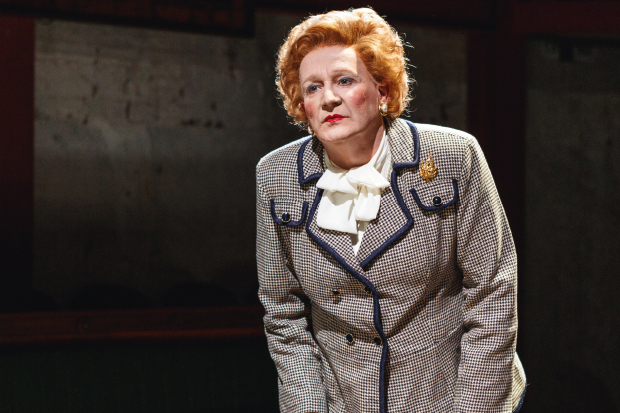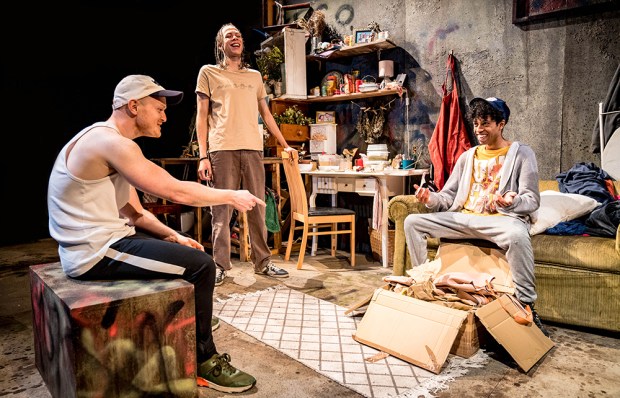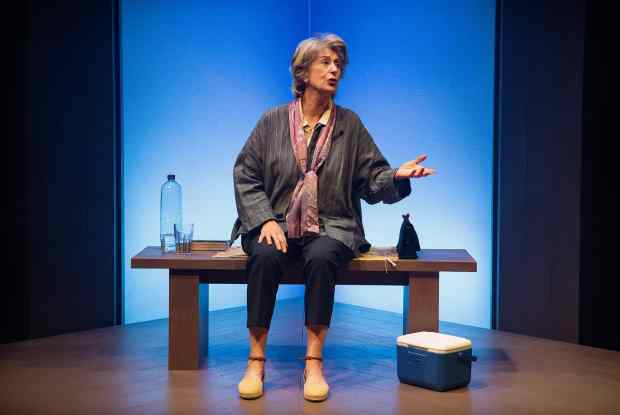Dead Sheep is a curious dramatic half-breed that examines Geoffrey Howe’s troubled relationship with Margaret Thatcher. Structurally it’s a Mexican bean. It leaps all over the 1980s and it keeps shifting genre from cabaret to tragedy via cheesy political satire. Some actors are impersonators, some are caricaturists, some are neither. James Wilby’s study of Howe avoids his personal mannerisms, the pensive shabbiness, the punctilious, worried eyes, and the soft beguiling purr of his vocal chords. Instead Wilby presents him as a bewildered monk tiptoeing around a lion’s den. Steve Nallon does Mrs Thatcher as a drag-queen which looks pretty odd next to Wilby’s straightforward Howe but Nallon is a master vocalist. He gets the intonation just right and with the intonation comes the character. This isn’t just a nannying foghorn but a voice that stretches to the length of a howitzer.
The play’s inspired idea is to bring Elspeth Howe, a philanthropic leftie, into the Thatcher circle. ‘The eyes of an executioner’ is Elspeth’s tart estimate of a woman she loathed but didn’t fear. The two enemies lock horns at a reception where Thatcher calls Elspeth ‘dear’, like a duke addressing a milkmaid, and asks if she understands the phrase, ‘that was a rather rhetorical question’. Elspeth: ‘There’s no such thing as “a rather rhetorical question”. It either is or it isn’t.’ The scene changes to Chevening, in Kent, the 3,500-acre estate which the Howes adored. In swans Alan Clark, seedy, arrogant, over-educated and dressed for dinner. He swills white wine, calls Howe a bore, tosses off a few quotations from Hegel, ogles Elspeth and gets chucked out before the second aperitif can be served. Elspeth claims her second High Tory scalp. These scenes are the play’s finest moments and I urge anyone to see them (and the BBC to film them), because I doubt if I’ll witness two better passages of arms this year.
Tim Wallers overcooks Alan Clark deliberately, and beautifully. And his version of Neil Kinnock is wildly absurd but utterly hilarious. The closing moments of the play tell a story that will never stale. In November 1990 English politics came as close as it has ever come to tragedy in the classic mould: proud tyrant felled by hubris. Even those who reviled Mrs Thatcher (and revulsion was the sentiment she instilled in me) will be moved, appalled and astonished once again by the story of her downfall. I hope the National sends an emissary to Park to polish up this flawed gem and put it in the Olivier.
The RSC is the Benefits Street of the acting profession, a clubbable safety-net, a cheerful doss-house that luckier luvvies earning top-dollar in Hollywood always praise to the skies while secretly pitying its itinerant lags. It also creates new plays like Oppenheimer, by Tom Morton-Smith, about the man who gave us nuclear war. The script highlights the difference between proper theatre, which aims to tell a gripping tale with adroit concision, and RSC theatre which aims to keep two dozen thesps busy on stage for the approved span of three hours. The infallible Bard wrote three-hour plays so that must be the right length.
We first meet Oppie, as everyone calls him, in the 1930s. A popular, hard-drinking, womanising brainbox, he hangs around with communists while not quite carrying a card himself. As documentary, the play works well. There are lectures in physics and exponential mathematics that are necessary but unobtrusive. And they aren’t boring either. That’s a big plus. As drama, things are less assured. The first act moves at a steady crawl, the second sags and wheezes. There’s too much of everything: characters, plot-threads, changes of scene, cutely crafted speeches. The thronging personalities feel samey and underdeveloped: stomping colonels, narky scientists, sozzled womenfolk, disillusioned Marxists, homesick Hungarians. And the story-line keeps changing. Can Oppie serve the US military without betraying his old commie chums? Can Oppie build the bomb before the Nazis? Can Oppie road-test his device before the Japs throw in the towel? This deprives the show of focus and leaves us wondering if the author is quite master of his materials.
And the play lacks a true climax. OK, there’s Hiroshima. The largest experiment on human guinea-pigs ever conducted is brought home with some deliciously gruesome details. But making Hiroshima dramatic is like melting butter during a forest fire. Towards the end Oppie vanishes from the story and reappears haunted, stooping and bitter. He makes a final angry speech which ties in rather neatly with a childhood bullying episode he mentioned 63 minutes earlier. This is a perfectly decent show, to be fair, but at three hours it’s obese. Split in half like the atom it would have twice the force.
Got something to add? Join the discussion and comment below.
Get 10 issues for just $10
Subscribe to The Spectator Australia today for the next 10 magazine issues, plus full online access, for just $10.
You might disagree with half of it, but you’ll enjoy reading all of it. Try your first month for free, then just $2 a week for the remainder of your first year.














Comments
Don't miss out
Join the conversation with other Spectator Australia readers. Subscribe to leave a comment.
SUBSCRIBEAlready a subscriber? Log in